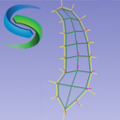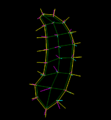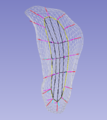Difference between revisions of "Documentation/Nightly/Extensions/SkeletalRepresentation"
From Slicer Wiki
| Line 23: | Line 23: | ||
Hippo_mesh.png|The surface mesh of hippocampus | Hippo_mesh.png|The surface mesh of hippocampus | ||
New_srep.png|Visualize the s-rep of the hippocampus | New_srep.png|Visualize the s-rep of the hippocampus | ||
| + | Initialize.png|Initialize the s-rep of the hippocampus | ||
</gallery> | </gallery> | ||
Revision as of 19:32, 2 January 2019
Home < Documentation < Nightly < Extensions < SkeletalRepresentationContents
Introduction and Acknowledgements
Acknowledgements: This work is part of Slicer Shape Analysis Toolbox (SlicerSALT), funded by NIH NIBIB R01EB021391 (Shape Analysis Toolbox for Medical Image Computing Projects), as well as the Slicer community.
Author: Zhiyuan Liu
Contributors: Pablo Hernandez-Cerdan, Jean-Christophe Fillion-Robin, Beatriz Paniagua, Jared Vicory, Junpyo Hong, Stephen M. Pizer
Contact: Zhiyuan Liu, zhiy at cs dot unc dot edu
Extension Description
This extension is an open source tool to establish, optimize and visualize skeletal representation (abbreviated as s-rep) of 3D objects in biomedical images. The main features of this extension include:
- Establish an s-rep by mean curvature flow of an object boundary
- Refine an s-rep to fit an object boundary
Modules
- Skeletal Representation Initializer
- Skeletal Representation Optimizer
- Skeletal Representation Visualizer
Use Cases
Sample data can be found here.
Tutorials
Similar Extensions
NA
References
- Stephen M. Pizer, Junpyo Hong, Jared Vicory, J. S. Marron, and others, "Object Shape Representation via Skeletal Models (s-reps) and Statistical Analysis" in Riemannian Geometric Statistics in Medical Image Analysis, no. (Xavier Pennec, Stefan Sommer, and Tom Fletcher, eds.), 2019.




